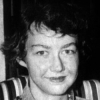Flannery O'Connor

Flannery O'Connor
Mary Flannery O'Connorwas an American writer and essayist. An important voice in American literature, she wrote two novels and 32 short stories, as well as a number of reviews and commentaries. She was a Southern writer who often wrote in a Southern Gothic style and relied heavily on regional settings and grotesque characters. Her writing also reflected her own Roman Catholic faith and frequently examined questions of morality and ethics. Her posthumously-compiled Complete Stories won the 1972 U.S. National Book...
NationalityAmerican
ProfessionNovelist
Date of Birth25 March 1925
CitySavannah, GA
CountryUnited States of America
There's a certain grain of stupidity that the writer of fiction can hardly do without, and this is the quality of having to stare, of not getting the point at once. The longer you look at one object, the more of the world you see in it; and it's well to remember that the serious fiction writer always writes about the whole world.
...free will does not mean one will, but many wills conflicting in one man. Freedom cannot be conceived simply.
Grace changes us and change is painful".
I do not like the raw sound of the human voice in unison unless it is under the discipline of music.
Doctors always think anybody doing something they aren't is a quack; also they think all patients are idiots.
He had the feeling that everything he saw was a broken-off piece of some giant blank thing that he had forgotten had happened to him.
A gift of any kind is a considerable responsibility. It is a mystery in itself, something gratuitous and wholly undeserved, something whose real uses will probably always be hidden from us.
When you leave a man alone with his Bible and the Holy Ghost inspires him, he's going to be a Catholic one way or another, even though he knows nothing about the visible church. His kind of Christianity may not be socially desirable, but will be real in the sight of God.
I preach there are all kinds of truth, your truth and somebody else's. But behind all of them there is only one truth and that is that there's no truth.
Everywhere I go, I'm asked if I think the universities stifle writers. My opinion is that they don't stifle enough of them. There's many a best seller that could have been prevented by a good teacher.
To expect too much is to have a sentimental view of life and this is a softness that ends in bitterness.
I write because I don't know what I think until I read what I say.
[Simone Weil's] life is almost a perfect blend of the Comic and the Terrible, which two things may be opposite sides of the same coin. In my own experience, everything funny I have written is more terrible than it is funny, or only funny because it is terrible, or only terrible because it is funny.
The dead don't bother with particulars.